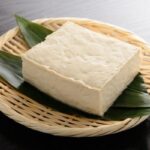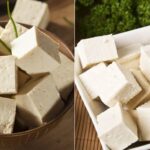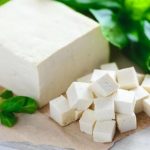Tofu is a plant-based protein source that is rich in vitamins and especially isoflavones from soy – a compound that is highly beneficial for balancing hormones in women.
Many elderly people believe that consuming tofu regularly helps maintain stable health, hence its preference in the diets of women and seniors.
Nutritional value of tofu: Tofu is a nutrient-dense food, particularly notable for its high calcium content – 100g of tofu can contain up to 140-160mg of calcium, making it an ideal choice for naturally supplementing calcium in the body.
In addition, tofu contains high-quality plant protein, soy isoflavones, iron, lecithin, and many other beneficial micronutrients. This food is low in calories and fat but packed with nutrition, making it ideal for vegetarians, seniors, and those watching their weight.
According to traditional medicine, tofu has a cooling property and is believed to boost energy, clear heat and toxins, and nourish the body. Regular consumption of tofu not only aids in maintaining a healthy weight but also helps prevent osteoporosis thanks to the natural phytoestrogens found in soy.
Can tofu cause kidney stones?
Some people worry that tofu may cause kidney stones due to its purine, calcium, and oxalic acid content – substances associated with stone formation. However, the levels of these substances vary depending on the processing method of soy products.
During the making of tofu and soy milk, a large amount of oxalic acid is dissolved in the water and removed during filtration, pressing, and curdling. Therefore, the finished tofu product is not purine-rich, and its oxalic acid content is also relatively low.

Nevertheless, different types of tofu have varying oxalic acid levels. For instance, lactone tofu retains more oxalic acid compared to tofu made with salt or gypsum. Nonetheless, the oxalic acid content in tofu is generally not high, so healthy individuals can consume it regularly, while those with a history of kidney stones can still enjoy it in moderate amounts and with proper preparation.
Tofu and breast health – Understanding the facts for safe consumption
There is a concern that tofu may contain hormones that could affect breast health. However, isoflavones in soy are phytoestrogens (plant hormones) and are not identical to the body’s endogenous hormones. Therefore, it cannot be concluded that tofu causes breast-related issues.
On the contrary, isoflavones have a two-way regulatory effect on hormones, helping to naturally balance them – especially beneficial for women in perimenopause and menopause. Consuming tofu appropriately can help alleviate some of the uncomfortable symptoms during these life stages. However, it is not a treatment, and its effectiveness may vary depending on individual body constitutions.

Note when eating tofu: Nutrition should be balanced with moderation: Even though tofu is a healthy food, eating too much at once can cause bloating, indigestion, and increased metabolic burden on the kidneys. Therefore, individuals with sensitive digestion or health conditions should consume it in moderation, preferring simple preparations with minimal oil and spices for optimal absorption.
While tofu is nutrient-rich, not everyone should eat large amounts of it. The following three groups of people are advised to limit their tofu intake to avoid potential health issues:
1. Individuals with weak spleen and stomach function
Tofu has a cooling property, so those with weak digestion or a sensitive stomach should consume it in moderation. Excessive intake may lead to bloating, nausea, chest discomfort, or diarrhea. For those prone to digestive issues or abdominal distension, tofu may not be the best choice.
2. People with iodine deficiency
Soy contains saponins, which help prevent atherosclerosis, but they also increase the excretion of iodine from the body. Regular tofu consumption can exacerbate iodine deficiency, so those with low iodine levels should eat tofu in moderation or as advised by their doctor.
3. Individuals taking Tetracycline antibiotics
Tofu is rich in calcium and magnesium, and these minerals can react with Tetracycline, reducing the antibiotic’s bactericidal effectiveness. If you are undergoing treatment with this medication, it is best to avoid tofu or consult a healthcare professional for guidance.






































